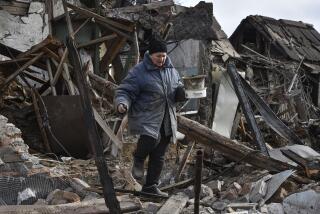Obama says Syria ‘is not some superpower chessboard contest’
President Obama defended his response to the growing crisis in Syria on Friday by pointing to the wars in Iraq and Afghanistan, cautioning against a commitment that risks drawing the U.S. into a new quagmire in the Middle East.
Obama appeared determined to take on critics whom he portrayed as impatient and ignorant of the complexity of the warring factions in Syria. He laughed off suggestions that Russian airstrikes in recent days against fighters opposed to President Bashar Assad, an ally of Moscow’s, have President Vladimir Putin looking stronger than Obama in Syria.
“We’re not going to make Syria into a proxy war between the United States and Russia,” Obama insisted during an afternoon news conference at the White House. “This is not some superpower chessboard contest. And anybody who frames it in that way isn’t paying very close attention to what’s been happening on the chessboard.”
He acknowledged that U.S. strategy, particularly his program to train and equip Syrian fighters to counter Islamic State extremists who have taken over parts of the country, has been less successful than he had hoped. But a deeper military engagement won’t necessarily result in success, Obama warned.
“Once we start something, we’ve got to finish it, and we’ve got to do it well,” Obama said. “Unless we can get the parties on the ground to agree to live together in some fashion, then no amount of U.S. military engagement will solve the problem.
“And we will find ourselves either doing just a little bit and not making a difference and losing credibility that way or finding ourselves drawn deeper and deeper into a situation that we can’t sustain.”
Obama attempted to clarify his policy on Syria after days of Russian airstrikes against Syrian groups opposed to Assad, and growing pressure on the president to answer for U.S. shortcomings in Syria.
Although Putin has said publicly that he wants to go after the Islamic State terrorists, his aerial campaign seems less focused on them than on territory held by other opposition forces that threaten Assad.
Like the Assad government, Putin does not seem to be drawing a distinction among Syrian rebel groups or to steer around any that might be backed by the U.S.-led bombing campaign in Syria.
Obama advisors say they take Putin at his word that he wants to stop the spread of the Islamic State extremists and to eradicate their safe havens in Syria. The White House insists that the only way to fight the spread of the Islamic State is for Assad to leave power and to defuse the political turmoil surrounding him.
Though the Obama administration says that the U.S. and Russia generally agree that some kind of political transition must happen in Syria, the two countries disagree about how long Assad would stay and how a change in government would come about.
In the hope of bringing Putin into the coalition-led strategy for fighting Islamic State, Obama is trying to emphasize common ground.
But the president said the U.S. would not cooperate with a Russian campaign that he said was designed simply to “prop up” Assad, and insisted that Putin risked further isolating himself through his ever-growing military commitment to support the dictator.
“Iran and Assad make up Mr. Putin’s coalition at the moment. The rest of the world makes up ours,” Obama confidently asserted.
Pentagon officials had their first round of military-to-military talks Thursday with Russian counterparts to avoid conflicts between their air forces in the skies over Syria.
The hour-long conversation was the first between U.S. and Russian defense officials in nearly two years; talks had been halted after the Russian annexation of Crimea and its continued involvement in the Ukrainian conflict.
Thursday’s discussion centered on how the two countries’ air crews could communicate – through international radio frequencies – if they found themselves in the same airspace.
Staff writer W.J. Hennigan contributed to this report.
For more White House coverage, follow @cparsons and @mikememoli
More to Read
Start your day right
Sign up for Essential California for news, features and recommendations from the L.A. Times and beyond in your inbox six days a week.
You may occasionally receive promotional content from the Los Angeles Times.








